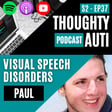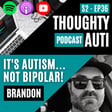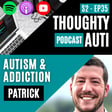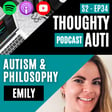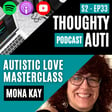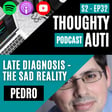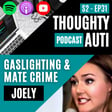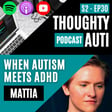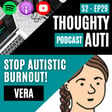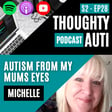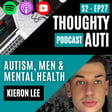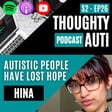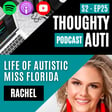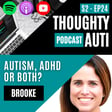
The Autistic Filmmaker with Scott Klumb
How can you make your special interest a job? Is Autism representation in film still an issue? How did Scott escape rock bottom?
Scott Klumb (The Autistic Filmmaker) is a multi-award winning videographer with an inspiring story and a difficult past.
In this episode of the Thoughty Auti Podcast, Thomas Henley talks to Scott about his experience overcoming addiction, finding the autistic community and his rise to glory in the film industry.
Scott recalls back to the time he started his filming career where he made a name for himself as a winter sports videographer... before breaking his back, both arms, knee, hip, wrist, foot and eye socket. Eventually, he followed through with his dream and created 'Autism - One Mans Journey' which received a lot of positive reviews, multiple awards and features at film festivals.
His filming style didn’t fit in during his film course at University, but it’s what made him stand out. He highlights that although he didn't finish his degree, it didn’t affect his job prospects... creating another documentary a few years later called 'Thriving On the Spectrum' which was made in collaboration with the autistic community in Colorado during the COVID-19 pandemic - of course becoming a huge success with even more awards than before.
Scott opens up about his experiences with bullying, isolation, mental health, psych ward visits and self-injury during his adolescence, and how he used drugs as a way to fit in and avoid negative experiences. He was diagnosed with PDD-NOS at 23 y/o instead of Aspergers Syndrome because he made money off his passion/special interest… autism gate-keeping much? - he couldn’t even get benefits due to this incorrect diagnosis.
With 10 years of sobriety as well as his decade long 'rock bottom', he recalls his issues with grieving 4 of his close friends following extreme sports injuries. Due to the horrible events happening to his friends and a shooting which occurred in his local coffee shop, he began to question his beliefs in God and fell into nihilistic despair. He used his extensive supply of medication as a crutch during this time, and highlights just how awful the side-effects and interactions were.
They end by talking about the shockingly low Autistic representation in film and TV, highlighting the recent controversy with Sia's movie... offering hope for aspiring filmmakers, actors, and autistic individuals wanting to make their dream a reality.
Scott's Links:-
Website - https://www.scottklumb.com/
Instagram - https://www.instagram.com/smkmedia/?hl=en
Song Of The Day (Listen Here) - https://open.spotify.com/playlist/5UDIyN5TSYN4zMcRoQPrG8?si=9255ed3480d840b5
▬▬▬▬▬▬▬▬▬▬▬▬▬▬▬▬▬▬▬▬▬▬▬▬▬▬▬▬▬▬▬
Website - https://www.thomashenley.co.uk
♫ THOUGHTY AUTI PODCAST - https://open.spotify.com/show/6vjXgCB7Q3FwtQ2YqPjnEV
FOLLOW ME On Social Media ♥ -
☼ Facebook - Thomas Henley
☼ Twitter - @thomashenleyuk
☼ Instagram - @thomashenleyUK






